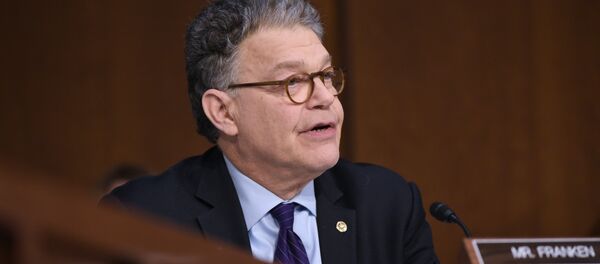The new poll from Public Policy Polling (PPP) found 50 percent of voters surveyed thought that the senator should resign, 42 percent believed that he should not resign, and eight percent were undecided.
The numbers hew closely to Franken's approval ratings: 53 percent approved of Franken's work as senator; 42 percent did not approve. Despite announcing plans to leave office over misconduct allegations involving women, Franken was more popular with women constituents: 57 percent of women surveyed approved, compared to 37 percent who did not.
Unsurprisingly, the poll found members of his party were more likely to support Franken remaining in office, with 71 percent of Democrats claiming he shouldn't resign. Fifty-two percent of independents supported Franken remaining in office as well.
Conversely, 71 percent of Republicans supported Franken resigning, with 22 percent claiming he should not step down.
PPP also found that 60 percent of those surveyed disliked the handling of Franken's resignation, believing the Senate Ethics Committee should have completed its investigation before any decisions were made about his tenure. Seventy-six percent of voters felt that their feelings on the resignation should have been more important to the process.
The poll was conducted with 671 Minnesota voters on Tuesday and Wednesday, with a margin of error of 3.8 percent.
Franken was accused of sexual misconduct or assault by eight women: conservative media personality Leeann Tweeden (who also provided photographic evidence of some of her claims), Minnesota resident Lindsay Menz, Army veteran Stephanie Kemplin, former staffer Tina Dupuy, and four other anonymous women.
After the allegations were brought against Franken in the second half of November and the beginning of December, dozens of Franken's Democratic colleagues in the Senate — including several prominent female senators — called on him to resign. Franken announced his resignation on the Senate floor the next day.
Franken's speech took a defiant tone, denying most of the allegations levied against him.
"I know in my heart that nothing I have done as a senator — nothing — has brought dishonor on this institution, and I am confident that the ethics committee would agree," the senator said, referring to the ongoing Ethics Committee probe into the allegations.
He had previously struck a more conciliatory tone, promising to hear and learn from the women making statements against him and tweeting in October that he would "listen, stand with, and support survivors" of sexual assault.
Although he pledged to resign, he did not accept any responsibility for the allegations and used the platform as an opportunity to slam US President Donald Trump for similar allegations brought against him.
"There is some irony in the fact I am leaving while a man who has bragged on tape about his history of sexual assault sits in the Oval Office and a man who has repeatedly preyed on young girls campaigns for the Senate with the full support of his party," said Franken, referring to Trump and Alabama Republican candidate for US Senate Roy Moore, respectively.
Once Franken's resignation goes through on January 3, he will be replaced with Tina Smith, currently the Democratic lieutenant governor of Minnesota. A special election for the seat will be held in November 2018.






